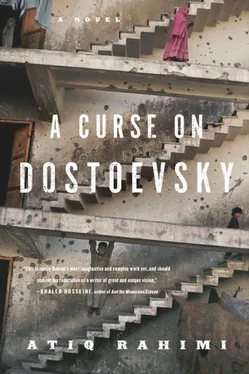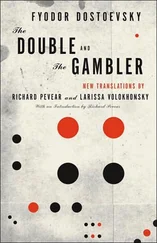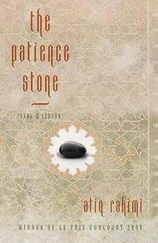“No. You stay here, we’re looking for your father,” instructs the clerk as he gives the child some money. Then he turns back to his big notebook, grumbling. “They say I’m the clerk, but actually I do everything around here. There are no trials these days, so I focus on the archives instead…” He is still leafing through the notebook. “I swear the rats would have gnawed through all these files by now if I weren’t here. Or else they would have been destroyed by bombs.”
“Yes, that’s true, it’s swarming with rats down here!” confirms the young man as he puts away the files on the instructions of the clerk.
Troubled by the clerk’s flippancy, Rassoul takes out a cigarette and lights it. His desperate voice becomes hoarse: “I’ve killed someone.” Neither of them takes any notice. Perhaps they didn’t hear. So he repeats more loudly, to make sure. “I’ve killed someone.” Both of them turn to look at him, but immediately and soundlessly return to their work.
Perhaps they heard, but didn’t understand.
He is finding it hard to speak. His voice is still muffled, barely audible.
He raises his voice and shouts: “But have you understood?” The clerk glares at him, but doesn’t reply. Again the silence, the heads bent over the files, the names, the numbers, the doubts… And Rassoul continuing, as if to himself: “I know it is no great achievement, I know I have not done anything terribly unusual. But that doesn’t matter. I have killed, and now I have come to hand myself over to the law.” With that, he sits down at the foot of a cupboard.
Rassoul’s stubborn presence weighs increasingly on the old clerk, who finally closes the large notebook. “Farzan, we will continue looking for your father tomorrow. Go and make some tea,” he says to the young man, who immediately puts the lamp on the table and asks excitedly: “Green or black?”
“Green or black?” repeats the clerk, turning to Rassoul.
“Black,” replies Rassoul wearily.
Farzan leaves. The old clerk picks up the lamp and walks over to the shelves. “That poor Farzan. Under the monarchy his father was a highly skilled accountant, and they were a respectable family. But then the communists came for the father, arrested him and sent him to prison without explanation. What was his crime? No one has ever been told and, as with all prisoners in that era, there was never any trial. They lost track of him. People said he was hanged, or exiled to Siberia. No one knows for sure what happened to him. And now his son is obsessed with finding out what became of his father. He wants to know what he was accused of. I know he will never succeed.” He returns to the desk. “In my opinion, the day the father was arrested something serious happened in the family, which the son has been trying to uncover and understand ever since. And that is what interests me, too. Not the rest of it—justice, injustice, etc. Those are only preferences, not philosophies.” He pauses for a moment to observe how Rassoul responds to his maxim, before continuing: “Since he started coming here, he has become my assistant…,” he chuckles. “I still love collecting stories about the law. They help one understand the history of a country, the character of a people. I have thousands of them. I need time to write them out. But nobody gives me that time. Look!” He points to a mound of files in one corner. “The supreme judge asked me for a list of all the mujahideen imprisoned during the communist era, and also a list of all the shahids . They say that the Ministry of Shahids is asking for it. The Ministry of Shahids!” He starts chuckling again, ironically this time, glancing at Rassoul who is staring sadly at a rat trap beneath the desk.
“So, young man, who did you kill?”
“A woman.”
“And were you in love with her?” he asks, continuing to tidy his papers.
“IN OUR dear legal system, killing a madam is not murder… So… so something else must be causing you this distress.” The clerk settles into his chair and stares intensely at Rassoul, who looks down and arduously swallows a small piece of bread. All three of them are sitting around the desk, transformed into a tea table. “To summarize: you are worrying, feeling completely distraught, because you can’t understand why your murder is shrouded in such mystery. Is that right?”
“Yes, but…”
“As I was saying, when I first heard your story, I thought you were suffering because you’d made such a mess of it; because you hadn’t taken the money and the jewels, which would have allowed you to save your family. Then you realized that if you did have the money and jewels belonging to Nana… what’s her name? Yes, that’s right, Nana Alia… you would feel even more haunted by remorse and regret. With hindsight, you see that the money and the jewels were just a pretext. Really, you killed that madam to wipe a cockroach off the face of the earth, and most of all to avenge your fiancée. But now you recognize that it didn’t change a thing. The murder didn’t ease your thirst for vengeance. It didn’t comfort you. On the contrary, it created an abyss into which you are plunging deeper every day… So what is tormenting you now is neither the failure of your crime nor the guilt of your conscience; rather, you are suffering from the futility of your act. In short, you are the victim of your own crime. Am I right?”
“Yes, that’s it, I am the victim of my own crime. And the worst thing is that not only was my crime banal and futile, it doesn’t exist. No one is talking about it. The body has mysteriously disappeared. Everyone thinks Nana Alia has just gone to the countryside, taking her money and her jewels with her. Have you ever, in all your legal archives, come across such an absurd case?”
“Oh, young man, I’ve seen crimes far more absurd than yours. And I have also seen that killing a madam doesn’t eradicate evil from the world. Especially these days. As you have said, in this country killing is the most insignificant act there is.”
“That’s why I’ve come to hand myself over to the law. I want to give my crime some meaning.”
“And have you given your life meaning, before you try to give some to your crime?”
“That’s exactly what I was trying to do with this murder.”
“Like all those who kill in the name of Allah so as to forget their sins! That’s nonsense, young man, nonsense! Do you understand?”
“Yes.” Rassoul nods before asking the clerk: “Have you read Dostoevsky?”
“No. Is he Russian?”
“Yes, he’s a Russian author, but not a communist. Anyway, that isn’t the point. He said that if God didn’t exist…”
“ Tobah na’ouzobellah! May Allah protect you from this deviance! Drive out that devilish thought!”
“Yes, may Allah forgive me! This Russian said— Tobah na’ouzobellah —that if God didn’t exist… everything would be permitted.” After a thoughtful silence, the clerk says: “He wasn’t wrong!” and murmurs into Rassoul’s ear: “So, how would your precious Russian explain the fact that here, today, in your dear country, everyone believes in Allah the Merciful yet all atrocities are permitted?”
“You’re saying that these people…” interrupts Farzan, bewildered by the turn of the conversation.
“You, boy, go and fetch the water!” instructs the clerk expediently, before continuing: “You know, we say that if sin exists, it is because God exists.”
“Yes, but these days it seems to me that it’s the other way round. May Allah forgive me! If he exists, it is not to prevent sins, but to justify them.”
“Well, yes, sadly. We are always using him, and History, and Conscience, and ideologies to justify our crimes and our betrayals. Rare are those who, like you, commit a crime and then feel remorse.”
Читать дальше












